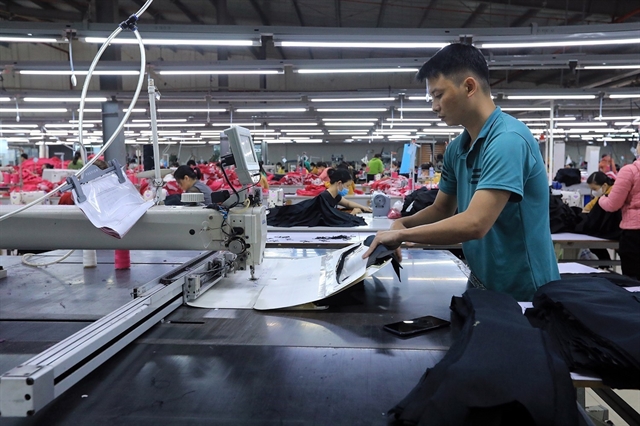 Economy
Economy


|
| A medium sized enterprise in Thanh Hóa Province. Việt Nam's small and medium sized enterprises (SMEs) are still struggling to meet ESG standards. —VNA/VNS Photo |
HÀ NỘI — Small and medium-sized enterprises (SMEs), which account for more than 90 per cent of all existing businesses, need solutions to help them access green capital.
At present, they face significant challenges in securing the capital needed to meet increasingly stringent Environmental, Social, and Governance (ESG) standards set by international partners, according to experts.
Deputy Minister of Home Affairs Nguyễn Thị Hà emphasised that ESG had become a global trend, critical not only for the sustainable development of enterprises, but also for the long-term success of nations.
Investors, consumers and communities were increasingly focusing on ESG factors when making decisions, making it essential for businesses to adopt these standards to maintain a competitive edge.
"Enterprises that implement ESG standards well will have a competitive advantage, attract investment and build a sustainable reputation," she said.
The Vietnamese Government has made it a priority to integrate ESG principles into the country’s socio-economic development framework, creating policies that encourage businesses to focus on sustainable growth, according to Hà. These policies include those aimed at environmental protection, social welfare and improving governance practices.
The Ministry of Home Affairs plays a key role in fostering an environment conducive to ESG practices by promoting legal frameworks, administrative reform and improved governance.
Despite positive changes in Việt Nam’s sustainable development policies, which have introduced green economy and circular economy initiatives, SMEs are still struggling to meet ESG standards.
The director of the Office of Enterprises for Sustainable Development at the Việt Nam Chamber of Commerce and Industry (VCCI), Nguyễn Tiến Huy, noted that while the Government had issued many policies to reduce carbon emissions, promote renewable energy and support digital transformation, these measures had not been fully effective for SMEs.
One of the most significant barriers for SMEs is access to capital, according to Huy.
Many green credit programmes have been introduced, but the requirements for these loans - such as financial transparency and adherence to ESG standards - are often beyond the capacity of smaller businesses.
Additionally, SMEs face challenges in obtaining modern, clean technology due to high upfront costs and a lack of suitable solutions.
Moreover, the concept of ESG remains new for many SMEs, particularly at the governance level, leading to slow or superficial implementation.
Huy suggested that for sustainable development policies to be effective, the government needed to focus on removing institutional barriers, promoting a transparent legal framework and offering more flexible financial mechanisms.
He also stressed the importance of providing ESG training and support to SMEs, enabling them to better align with global trends.
The Director of the Institute of Economics and Enterprise Development and Vice President of the Hanoi Association of SMEs, Mạc Quốc Anh, identified some positive developments in the ESG landscape.
Green credit has grown by 22 per cent compared to the previous year, and international capital is flowing into ESG initiatives, with a significant commitment of US$ 210 million from the International Finance Corporation (IFC).
The legal framework for ESG has become clearer and business awareness of ESG is increasing, especially among those seeking to access foreign direct investment (FDI) markets.
However, Quốc Anh pointed out several ongoing challenges. Only 4.5 per cent of the finance commitment has been disbursed, and SMEs are struggling to access these funds due to issues like a lack of collateral and unfamiliarity with ESG standards.
Furthermore, up to 60 per cent of small businesses are unsure where to register for support and many do not even understand what ESG means. The lack of expertise in ESG is another barrier, making it harder for businesses to implement these standards effectively.
Quốc Anh proposed several solutions to address these challenges, including the establishment of a green credit guarantee mechanism, the shortening of green criteria and promoting the digitalisation of business data.
He also suggested offering tax incentives for green businesses and building a network of ESG consultants to support companies along the value chain.
The deputy director of the Department of Credit for Economic Sectors at the State Bank of Vietnam (SBV), Phạm Thị Thanh Tùng, highlighted the critical role of the financial sector in supporting ESG implementation.
As climate change intensifies, the banking industry is increasingly integrating green credit policies and environmental risk management mechanisms.
The SBV is working to develop strategies for green banking, focusing on sectors like agriculture, energy and construction materials production that are particularly vulnerable to environmental risks.
The SBV has also prioritised sustainable agricultural lending programmes, climate change response projects and high-quality rice cultivation, signalling the growing importance of ESG in the banking sector’s credit approval process. — VNS




